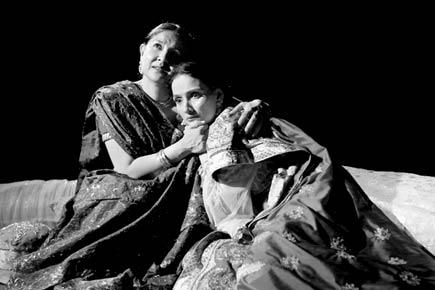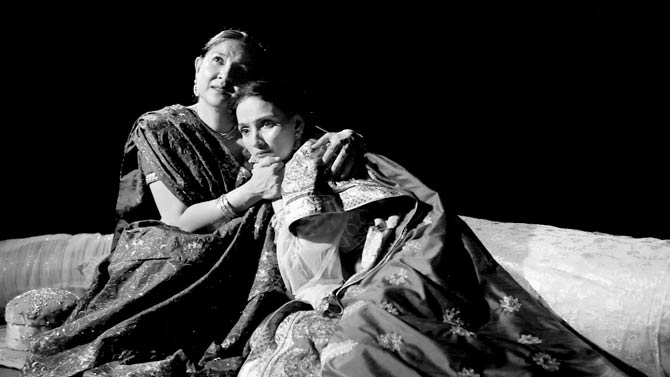The first of the two big theatre festivals that take place towards the end of the year, the Prithvi Theatre Festival concluded on Sunday with the Carnival, that has performers coming together for a celebratory adieu to the days of hectic activity, plays, fringe performances, music and talks with theatrewalas — enveloping the cosy theatre with warmth and fellow feeling

 The first of the two big theatre festivals that take place towards the end of the year, the Prithvi Theatre Festival concluded on Sunday with the Carnival, that has performers coming together for a celebratory adieu to the days of hectic activity, plays, fringe performances, music and talks with theatrewalas — enveloping the cosy theatre with warmth and fellow feeling. (The second festival, Centrestage, starts later this month).
The first of the two big theatre festivals that take place towards the end of the year, the Prithvi Theatre Festival concluded on Sunday with the Carnival, that has performers coming together for a celebratory adieu to the days of hectic activity, plays, fringe performances, music and talks with theatrewalas — enveloping the cosy theatre with warmth and fellow feeling. (The second festival, Centrestage, starts later this month).
ADVERTISEMENT
Of the plays watched (and it is not possible to catch all of them), two new productions that showed potential (once initial glitches are ironed out) are Akash Khurana’s Bombay Dying and Lillete Dubey’s Gauhar.
 A still from Lillete Dubey’s Gauhar, which is the story of the singing star Gauhar Jaan, who was possibly the first in India to lend her voice for records
A still from Lillete Dubey’s Gauhar, which is the story of the singing star Gauhar Jaan, who was possibly the first in India to lend her voice for records
The first, written by Hussain Dalal and Khurana, is in keeping with the group’s (Akvarious) preference for contemporary urban stories that can easily be related to, and studded with good performances. It was good to see actors Kumud Mishra, Ayesh Raza Mishra and Ira Dubey act in this play, since they are not normally associated with Akvarious, but then many of today’s theatre groups believe in a healthy, non-competitive environment, and sharing of resources.
The play is set in the city and the three loosely connected stories have one thing in common — the old Bombay Dyeing mill in central Mumbai. For a Mumbai resident, either of a certain vintage, or interested enough in the city’s history, this fact by itself gives the characters and stories an added dimension. The background of the thriving mill district, the destructive textile mill strike and the gradual transformation of the spaces where people worked and lived, into a glittering hub of malls, high-end shopping, swanky restaurants and pubs, is a familiar story of heartless development. The other event that touches the lives of the characters, are the communal riots that wracked the city and altered its secular nature.
Shakir (Mishra) is found dead by Mary (Shriya Pilgaonkar — excellent), the sweet, lonely chambermaid of a seedy hotel; the man who was one of the few who prospered with the mills locked him out with a handsome compensation, but guilt about a past crime haunts him. In contrast, living in a high-rise apartment built over the graveyard of the old mill, are a yuppie couple (Ira Dubey-Tariq Vasudeva), who may not want for anything financially, but the stress of urban living takes a toll on them. Shakir’s Hindu employee (Siddharth Menon) is haunted by his own ghosts, but does not allow tragedy to turn him into a vengeful animal. And there’s the strange, flirty hotel guest (Anand Tiwari), who could be every woman’s nightmare.
From the everyday-ness of Mumbai living to the glories of the past in Lillete Dubey’s Gauhar (Vikram Sampath’s book on Gauhar Jaan provided the inspiration for Mahesh Dattani’s script), the story of the singing star who was possibly the first to lend her voice for records in the early days of the technology, when most singers imagined the gramophone machine would snatch their souls.
Dubey’s coup lies in getting Zila Khan onto the stage to play Gauhar’s mother Malka, as well as the older Gauhar — and she is a marvelous singer. Rajeshwari Sachdev, resplendent in beautiful saris and jewellery, makes for a glamorous Gauhar Jaan, but lacks the requisite lung power in her singing.
The story of a talented tawaif, Malka, and her daughter, follows the trajectory of many women of that class, in that age — their singing and dancing skills gave them some measure of financial independence, but also left them vulnerable to exploitation by the men in their lives — fathers, as well as husbands, and in the case of Gauhar Jaan, even her mother’s supposedly loyal servant.
The structure of the play needs a bit of touching up and Gauhar Jaan’s achievements and life highlighted a bit more, so that the portrait of the woman emerges with more clarity (Purva Naresh’s plays, Bai Se Bioscope Tak, Aaj Rang Hai and Umrao capture the tawaif’s life with remarkable emotional nuance).
Apart from the plays showcased at the festival, casual conversations with theatre practitioners, underline the difficulties of groups who want to do artistic work; not only is it difficult to raise funds (some are trying out crowdfunding), there are hardly any mid-sized and affordable theatres in Mumbai. For the big producers, there are the large auditoriums (even to get dates in these is tough), sponsors and audiences ready to pay high ticket rates. But where do the small, mid-sized and experimental theatre people go? Alternative spaces are slowly opening up, but it’s not the same as performing in a properly equipped theatre, and a 200-400 seater auditorium is ideal for off-mainstream plays, and more of these are badly needed in a culture-deprived city.
Deepa Gahlot is an award-winning film and theatre critic and an arts administrator. She tweets at @deepagahlot
 Subscribe today by clicking the link and stay updated with the latest news!" Click here!
Subscribe today by clicking the link and stay updated with the latest news!" Click here!






